-
Courses

Courses
Choosing a course is one of the most important decisions you'll ever make! View our courses and see what our students and lecturers have to say about the courses you are interested in at the links below.
-
University Life

University Life
Each year more than 4,000 choose University of Galway as their University of choice. Find out what life at University of Galway is all about here.
-
About University of Galway

About University of Galway
Since 1845, University of Galway has been sharing the highest quality teaching and research with Ireland and the world. Find out what makes our University so special – from our distinguished history to the latest news and campus developments.
-
Colleges & Schools

Colleges & Schools
University of Galway has earned international recognition as a research-led university with a commitment to top quality teaching across a range of key areas of expertise.
-
Research & Innovation

Research & Innovation
University of Galway’s vibrant research community take on some of the most pressing challenges of our times.
-
Business & Industry

Guiding Breakthrough Research at University of Galway
We explore and facilitate commercial opportunities for the research community at University of Galway, as well as facilitating industry partnership.
-
Alumni & Friends

Alumni & Friends
There are 128,000 University of Galway alumni worldwide. Stay connected to your alumni community! Join our social networks and update your details online.
-
Community Engagement

Community Engagement
At University of Galway, we believe that the best learning takes place when you apply what you learn in a real world context. That's why many of our courses include work placements or community projects.
The Cognitive Genetics & Cognitive Therapy (Coggene) Group
The CogGene group, directed by Prof. Gary Donohoe, (Psychology) and Dr. Derek Morris (Biochemistry) has strong collaborative ties with both the neuropsychiatric research group at TCD (with Prof. Aiden Corvin and Prof. Michael Gill) and the clinical neuroimaging group at NUIG (with Prof. Colm McDonald and Dr. Dara Canon).
Aspects of brain structure, such as brain volume and white matter integrity, and brain functions, such as cortical activations that occur during information processing are likely to mediate the effects of genetic risk variants on illness. In what is often described as an ’intermediate phenotype’ or 'endophenotype' approach, studying these brain based ’phenotypes’ may help bring us closer to the mechanism of gene activity so as to understand the broader illness phenotype. To do this our work draws on neuropsychological, electrophysiological, and neuro-imaging techniques for investigating the role of gene function at the level of individual brain systems. This work has led to a number of important insights into newly discovered risk genes for psychosis. As part of this work the group is actively involved in developing psychological therapies for major mental health disorders, including therapies that address cognitive deficits in schizophrenia.
The group participates in several international consortia focused on the genetics of psychosis and the genetics of brain structure and function, including the ENIGMA consortium, the COGENT consortium, the GENUS consortium, the Psyscan consortium, and the Psychiatric Genomics Consortium (PGC).
Prof. Gary Donohoe talks about schizophrenia and the iRELATE project on Newtalk’s Futureproof.
Listen to the podcast here > http://www.newstalk.com/podcasts/Futureproof/Futureproof_with_Jonathan_McCrea/181010/Newsround_Exoplanets_and_Schizophrenia
Prof. Gary Donohoe – NUIG Professor & Established Chair of Psychology. Director, CogGene Group
Gary was appointed to the school of psychology as Professor of psychology in July 2013. Following the completion of his Doctoral training in Clinical Psychology at Trinity College Dublin, Gary undertook a research fellowship in the TCD neuropsychiatric genetics research, where he earned a PhD in Cognitive Genomics and began the cognitive genomics lab. He was appointed an assistant professor in TCD’s school of medicine in 2006, and associate professor in 2009, where he was responsible for the school of medicine psychology program until 2013. Gary’s research focuses on understanding the genetic and neural basis of cognitive deficits associated with psychosis, and the development of therapeutic programs for overcoming these deficits. Gary continues to lead the Cognitive Genetics and Cognitive Therapy (CogGene) group, members of which are based between the school of psychology NUIG and TCD, where he holds the position of adjunct Professor in the school of medicine and principal investigator in the Trinity College Institute for Neuroscience. Gary also continues to be clinically active in mental health service delivery.
Dr. Derek Morris - NUIG Lecturer in Biochemistry. Co-Director, CogGene Group
Derek Morris graduated with a B.Sc. in Biotechnology from the National University of Ireland, Galway in 1998. In 2001, he completed his PhD in molecular genetics at the Department of Psychological Medicine, Cardiff University. He subsequently joined the Neuropsychiatric Genetics Research Group in TCD as a research fellow and was awarded a HRB Postdoctoral Career Development Research Fellowship in 2003. In 2006, Dr. Morris was appointed Lecturer in Molecular Psychiatry within the Dept. of Psychiatry in TCD and in 2013 moved to NUI Galway where he is now Lecturer in Biomedical Science.
Dr. Morris’ research interests are the development of novel methods for mapping genes for complex diseases and the application of high-throughput genomics technologies to the detection of risk genes for schizophrenia and bipolar disorder. He has extensive experience of genome-wide association studies and using SFI funding, set up TrinSeq, the first next-generation sequencing lab in Ireland in 2008. He is currently President of the Irish Society of Human Genetics. His contribution to the Cognitive Genetics Group is study design and the management of biosample resources and genetics data used for ongoing studies.
Dr. April Hargreaves - Postdoctoral fellow
April graduated with a B.A (Hons) in psychology from UCD in 1997. In 1998 she completed her Masters in neuroscience at the Institute of Psychiatry, Denmark Hill. She recently completed her doctorate in neuropsychology and genetics with the Department of Psychiatry, Trinity College Dublin, where her research focused on the neuropsychological profile of schizophrenia risk variants recently identified in genome wide association studies. Currently April is involved in the running of a cognitive remediation therapy (CRT) programme, assessing the impact of memory training in patients with psychosis. April also works as assistant psychologist in the Central Mental Hospital, Dundrum.
David Omar Mothersill - Postdoctoral Fellow
David’s research focuses on deficits in social cognition across neuropsychiatric disorders and how these deficits may be examined at the level of the brain, using functional magnetic resonance imaging (fMRI). This research also involves evaluating the effects of specific genetic and environmental risk factors for mental illness on brain activity and functional connectivity during social information processing.
Prior to working as a Post-doctoral Fellow, David's PhD focused on the impact of psychiatric risk variants on brain activity and functional connectivity using fMRI and a range of analysis techniques including seed-based correlation.
David previously completed a B.A. (Hons) in Science in 2007 (specialising in Zoology), and M.Sc. in Neuroscience in 2009. After finishing his Master’s, David worked as a research assistant in the Trinity Department of Psychiatry, and then on IMAGEN, a Europe-wide imaging genetics project examining brain development during adolescence.
Rachel Dillon - PhD student
Rachel graduated in 2011 from Rachel graduated from Vanderbilt University in Nashville, Tennessee with a B.A. in Psychology. Her Ph.D, which she started within the Department of Psychiatry in 2012, aims to investigate adherence to computerized cognitive remediation therapy (CRT) for psychosis. Her work focuses on psychological factors that predict treatment non-adherence, including contextual, patient, and illness related factors.
Donna Cosgrove - PhD student
Donna has a background in Pharmacy, graduating with a BPharm (Hons) from the Royal College of Surgeons in Ireland in 2009. She completed an M.Sc. in Neuropharmacology in 2013 and then started a PhD in the Dept. of Psychology in NUI Galway in 2014. Donna’s PhD project aims to investigate the effect of genetic variants that have been found to contribute to schizophrenia, particularly looking at cognitive differences and neurobiological pathways affected.
Mairead Flynn - PhD Student
Mairead graduated in 2015 with a BSC. (Hons) in Biomedical, Health and Life Sciences from University College Dublin. Her PhD, which she started with the Department of Biochemistry in NUI Galway in 2015, aims to investigate the role of the centrosome in the biology of schizophrenia and associated cognitive deficits.
Jessica Holland - PhD Student
Jessica graduated with a BSc. (Hons) in Psychology from the University of Limerick in 2014. Following this, she completed a MSc. in Neuropsychology, awarded by University of Maastricht in 2015. Jessica's PhD project centers on genetic risk factors for psychosis and brain activity related to social cognition, and particular genetic risk factors for schizophrenia related to immune health.
Laura Whitton - PhD Student
Laura graduated with a BSc. (Hons) in Neuroscience from the University of Dublin in 2010. Following this, she completed a MSc. in Molecular Medicine, awarded by Trinity College Dublin in 2012. In 2014, she started a PhD in the Dept. of Biochemistry at NUI Galway. Laura’s PhD project focuses on schizophrenia risk genes that function in epigenetic processes and how variants in these genes may contribute to cognitive deficits associated with schizophrenia. Her future aim is to investigate functional consequences of these risk variants in a neuronal cell line and to determine downstream pathways affected by changes in these genes which may contribute to schizophrenia pathology.
Eoin Molloy - MSc Student
Eoin earned his BA (Hons) in psychology from NUI Maynooth in 2013 and is currently working on his MSc in neuropsychology at Maastricht University in the Netherlands. He is currently completing a research internship as part of his MSc at NUI, Galway. Here, his research centres on imaging genetics and functional connectivity analysis (both using fMRI) as well as neuropsychological assessment of the cognitive deficits in schizophrenia, in particular working memory dysfunction. Eoin also hopes to take his research further and complete a PhD in the future.
Dr Ken O’Reilly - Lecturer in Clinical Psychology
Ken has a background in Counselling and Clinical Psychology. He completed a Masters in Counselling Psychology in 2004 at TCD and a Doctorate in Clinical Psychology at UCD in 2009. Ken has experience working with young people and their families and also with adults who have a variety of mental health needs. In 2011 he took up a joint appointment with the Central Mental Hospital and the Department of Psychiatry TCD. He has a special interest in developing psychological therapies for forensic mental health patients, particularly those who have been diagnosed with schizophrenia and schizoaffective disorder.
Craig Chigwidere - Lecturer in Cognitive Behavioural Therapy
Craig studied psychiatric nursing at Brighton University before branching into counselling and specialising in cognitive behavioural psychotherapy (CBT). He completed an MA in Counselling Studies at Brighton and a diploma in Cognitive Behavioural Psychotherapy at King’s College London (KCL). He then worked in Neuropsychiatry at Maudsley Hospital and developed an interest in research into and treatment of non-epileptic seizures. He then completed an MSc in Psychiatric Research at the Institute of Psychiatry, KCL. He became involved in the teaching and supervision of CBT through the CBT courses at the Institute of Psychiatry, KCL. In 2007 he moved to Dublin, to work as a CBT therapist at St Patricks Hospital and Clinical Lecturer at Trinity College Dublin. Craig is currently director of the Foundation Course in CBT and Clinical Lecturer with the CBT Courses at TCD. His research interests include dissociation, therapist self-development and the dissemination of CBT. He is currently researching the utility of self-practice and self-reflection (SP/SR) as an alternative to personal therapy in CBT and the impact of behavioural activation as applied by briefly trained nurses in an inpatient setting.
Our research is focused on the key question: how do genes increase risk for psychosis? To address this question we are studying the effects of recently identified psychosis risk genes on brain structure and brain function. Identifying and characterising how neural systems are affected by risk genes can tell us much about the neurobiology of the psychosis, a key requirement for the development of new treatments. Two recent developments in this work include focusing on risk genes effects on aspects of social cognition, and communication or ’connectivity’ between brain regions.
1. Social cognitive neuroscience
Disability in schizophrenia (SZ) results from, and is predicted by, deficits in social cognition that are not targeted by current treatments. Targeting these deficits is challenging because the underlying neural mechanisms are poorly understood. The purpose of our research into this area is twofold: (1) to delineate patterns of abnormal activations within cortical and sub-cortical regions during performance of social cognition tasks; (2) to comprehensively evaluate the impact on social cognition of common and rare genetic variation contributing to the genetic architecture of schizophrenia and related phenotypes. Investigating the biology of social cognition in SZ patients rather than simply in healthy participants is relatively novel for our field. Moreover, analysis of imaging data on patients and controls collected here, together with our existing behavioural social cognition data and genome data, uniquely positions us to establish the effects of risk variants on social cognition at the level of behaviour, cortical activation, and neuroanatomy.
2. Neural Connectivity
Neural connectivity has recently been proposed as an intermediate phenotype for schizophrenia. In the CogGene lab, we are examining the effects of specific schizophrenia risk variants on:
1. Structural connectivity: the white matter tracts connecting different parts of the brain;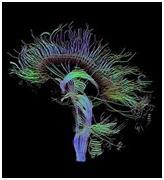
2. Functional connectivity: the correlation of activity between different parts of the brain;
3. Effective connectivity: the effect of one group of neurons on another.
To carry out this research, we are using diffusion tensor imaging (DTI) and functional magnetic resonance imaging (fMRI), with analysis techniques including DTI tractography, psychophysiological interactions (PPI) and dynamic causal modelling (DCM). Characterising the effects of these variants on neural networks has the potential to further elucidate the mechanisms by which they increase risk, which may guide future treatment strategies.
3. Cognitive remediation Training
Cognitive difficulties are prevalent in people with a diagnosis of psychosis and are associated with poor long-term functioning. This is particularly true of deficits in working memory. Previous research has shown that improving working memory can improve cognitive flexibility, and as such a new computerized cognitive remediation therapy (CRT) programme has been developed within the CogGene group to target working memory specifically. The purpose of our research is to determine whether this CRT programme improves working memory in patients with psychosis and whether any improvement observed can be generalized to other areas of cognition.
Our lab uses a variety of approaches to understanding and addressing disability associated with serious mental health disorders.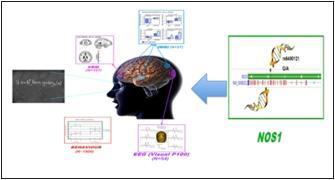
1. Neuropsychological Assessment
Measures of neuropsychological ability, including general cognitive ability (IQ), memory, and attention have been extensively used to investigate variance in cognition in both health controls and patients. This provides a relatively simple and cost-effective strategy for measuring the effects of individual genes on cognition in large numbers of individuals.
2. Electrophysiological Tests
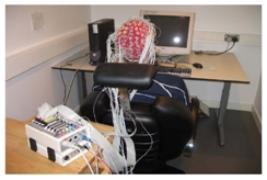 The use of high density EEG to study variance in sensory information processing, both at early and late processing stages involves a non-invasive measurement of electrical impulses picked up by scalp electrodes. This approach allows mili-second accuracy in recording brain responses to visual and auditory stimuli.
The use of high density EEG to study variance in sensory information processing, both at early and late processing stages involves a non-invasive measurement of electrical impulses picked up by scalp electrodes. This approach allows mili-second accuracy in recording brain responses to visual and auditory stimuli.
3. Neuroimaging Approaches
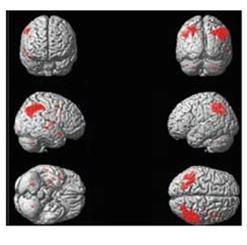 This involves the use of MRI for a wide range of purposes, including measurement of grey and white matter density, white matter integrity (DTI), and functional MRI (fMRI). Collectively, these approaches provide millimetre accuracy in investigating the influence of individual genes on brain structure and function.
This involves the use of MRI for a wide range of purposes, including measurement of grey and white matter density, white matter integrity (DTI), and functional MRI (fMRI). Collectively, these approaches provide millimetre accuracy in investigating the influence of individual genes on brain structure and function.
The work of the Cognitive Genetics and Cognitive Therapy group is generously funded by several national and international sources, including Science Foundation Ireland (SFI), the Health Research Board (HRB), the Irish Research Council, and the National Institute of Mental Health (NIMH).
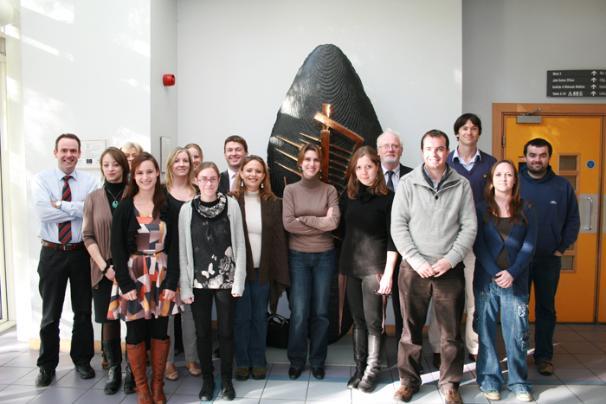
Past TCD CogGene Lab members include: Heike Schmidt, Therese O’Donoghue, Rosie Peel, Josen McGrane, Judy Haydn, & Sarah Clarke.
Complete list of the group’s peer reviewed publications



















